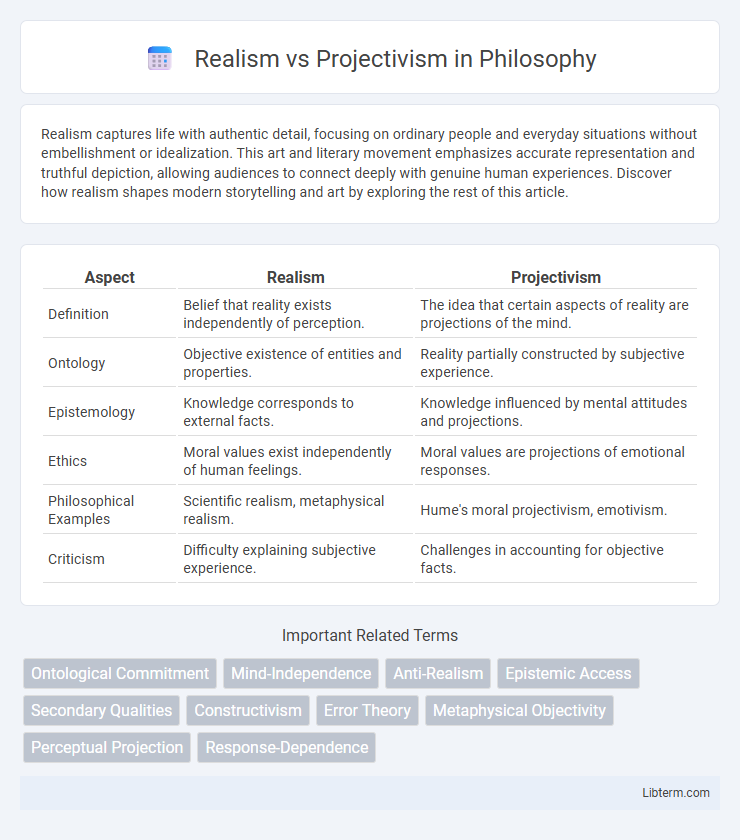Realism captures life with authentic detail, focusing on ordinary people and everyday situations without embellishment or idealization. This art and literary movement emphasizes accurate representation and truthful depiction, allowing audiences to connect deeply with genuine human experiences. Discover how realism shapes modern storytelling and art by exploring the rest of this article.
Table of Comparison
| Aspect | Realism | Projectivism |
|---|---|---|
| Definition | Belief that reality exists independently of perception. | The idea that certain aspects of reality are projections of the mind. |
| Ontology | Objective existence of entities and properties. | Reality partially constructed by subjective experience. |
| Epistemology | Knowledge corresponds to external facts. | Knowledge influenced by mental attitudes and projections. |
| Ethics | Moral values exist independently of human feelings. | Moral values are projections of emotional responses. |
| Philosophical Examples | Scientific realism, metaphysical realism. | Hume's moral projectivism, emotivism. |
| Criticism | Difficulty explaining subjective experience. | Challenges in accounting for objective facts. |
Introduction to Realism and Projectivism
Realism asserts that moral properties exist independently of human beliefs or emotions, grounding ethical truths in objective reality. Projectivism, by contrast, suggests that moral values are projections of human attitudes and emotions onto the world rather than reflections of objective facts. Understanding these foundational perspectives highlights key debates in metaethics regarding the nature and existence of moral truths.
Defining Realism in Philosophy
Realism in philosophy asserts that reality exists independently of our perceptions, beliefs, or linguistic practices, emphasizing an objective world structured by universal truths. This position contrasts with projectivism, which contends that our mental states shape or project features onto the world rather than reflect an external reality. Realism anchors knowledge claims in mind-independent facts, supporting the notion that entities and properties possess an existence beyond human cognition.
Understanding Projectivism: An Overview
Projectivism in philosophy asserts that individuals project their subjective experiences, emotions, or conceptual frameworks onto the external world, influencing how reality is perceived rather than reflecting an objective truth. This view contrasts with Realism, which holds that reality exists independently of our perceptions and beliefs. Understanding Projectivism requires examining its roots in cognitive science and ethics, where it explains how personal attitudes shape moral judgments and perceptual interpretations.
Historical Roots and Evolution
Realism in philosophy, originating in ancient Greek thought with Aristotle, asserts that universals exist independently of human minds, influencing medieval scholasticism and modern metaphysics. Projectivism, rooted in Hume's 18th-century empiricism, argues that humans project subjective qualities onto external objects, shaping contemporary metaethics and philosophy of mind. The evolution of both theories reflects ongoing debates over objectivity, representation, and the nature of reality in analytical philosophy.
Key Differences Between Realism and Projectivism
Realism asserts that moral facts exist independently of human beliefs, while projectivism claims that moral judgments project individual emotions or attitudes onto the world. Realism upholds objective truth in ethics, whereas projectivism emphasizes subjective experience and the psychological origins of moral statements. Key differences lie in the ontological status of moral properties and the epistemological approach to ethical knowledge.
Major Philosophers and Influential Works
Realism, prominently defended by philosophers like Aristotle in *Metaphysics* and more recently Hilary Putnam in *Reason, Truth and History*, posits that reality exists independently of our perceptions. Projectivism, championed by David Hume in *A Treatise of Human Nature* and further developed by Simon Blackburn in *Essays in Quasi-Realism*, argues that our mind projects emotions or moral properties onto the world rather than discovering them as objective truths. The debate critically shapes metaethics and epistemology, influencing how knowledge, truth, and moral values are understood.
Applications in Ethics and Science
Realism in ethics asserts that moral facts exist independently and can be objectively known, influencing scientific approaches by promoting empirical investigation of ethical principles. Projectivism argues that moral values are projections of human attitudes, shaping scientific interpretations by emphasizing subjective experiences and cultural contexts. These contrasting views affect the development of ethical frameworks in disciplines such as bioethics, environmental science, and psychology, where the objectivity or subjectivity of moral claims alters policy-making and research methodologies.
Criticisms of Realism and Projectivism
Realism faces criticism for its assumption that moral facts exist independently of human perception, which critics argue lacks empirical verification and struggles to explain moral disagreement. Projectivism is challenged for allegedly reducing moral judgments to mere expressions of attitude, undermining objective moral truths and leading to relativism. Both views are debated over their capacity to adequately account for moral reasoning and the nature of ethical objectivity.
Contemporary Debates and Perspectives
Contemporary debates in realism versus projectivism center on whether moral properties exist independently of human attitudes or whether they are projections of these attitudes. Realism asserts that moral facts are objective and mind-independent, supported by arguments from moral intuition and epistemic access to moral truths. Projectivism, by contrast, emphasizes the psychological origins of moral judgments, arguing that moral discourse reflects emotional or evaluative projections rather than ontologically robust properties.
Conclusion: Weighing the Two Theories
Realism asserts that moral facts exist independently of human opinions, while projectivism contends that moral judgments express emotional responses rather than objective truths. Weighing these theories requires evaluating their explanatory power, with realism offering a stable ethical framework and projectivism accounting for the variability of moral experience. Selecting between them hinges on one's acceptance of objective morality versus the interpretive role of human psychology in ethics.
Realism Infographic

 libterm.com
libterm.com